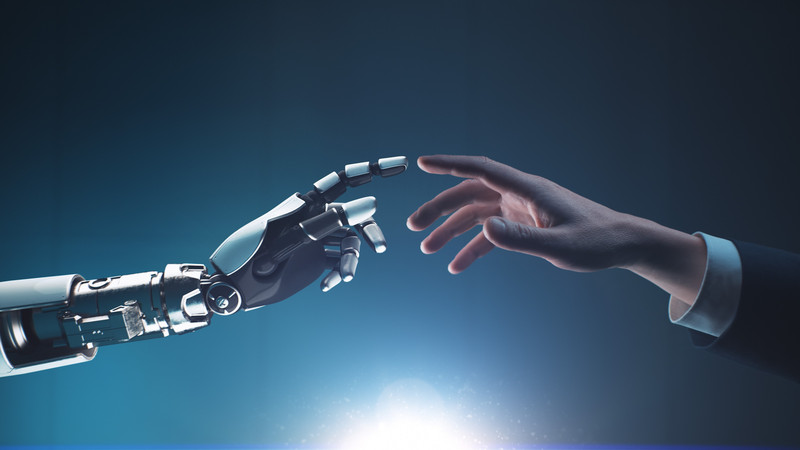
As ChatGPT’s trendiness questions the value of some parts of the workforce, the value of human intuition is also up for debate.
As industries and executives explore how to use AI-powered chatbots like ChatGPT best, the value of human intuition in the workplace has come into question. If technology can communicate at a conversational level with insight based on billions, if not trillions, of data points, how can humans compete?
Some believe that artificial intelligence has its limits within the workplace, particularly in corporate finance. When it comes to innate human-centric skills — things like leadership, people, and communication skills — the human touch is still unmatched by automation.
Matt Malek, recently promoted to CFO of intelligent virtual assistant provider Interactions, spoke to CFO about AI’s impact on corporate finance. Malek shared insight into what areas CFOs should integrate this type of technology, and what areas aren’t as exposed to the potential of ChatGPT-like programs as one may think.
AI-Chatbots: Innovation With Human Help
Amidst the fascination of chatbots and their ability to spew information, the approach to incorporating technology into the fabric of a business is as essential as it is difficult. According to Malek, it falls on the CFO to be aware of how this technology works — and much more. Their understanding should allow them to take an approach that is less about learning the technology and more about how it can make an impact on their business.
“CFOs are not just financial stewards, but also connectors and thinking partners throughout an enterprise,” said Malek. “We have a responsibility to understand where investments in AI-powered technologies, like chatbots or virtual assistants, can be impactful.”
While he admits consumers don’t like talking to AI chatbots in a customer service situation, Malek believes the value this tech provides a great upside for the customer service sector.
“The customer service industry is one area where this investment makes a lot of sense, especially as it relates to efficiency and productivity.
“We’ve all encountered an ineffective bot in customer service,” Malek continued. “Unfortunately, bad technology has given all customer service technology a bad rap. Effective AI-powered solutions are changing the game.”
“A big part of improvements is due to better technology — a blend of machine learning, natural language processing, and automated speech recognition fueled by comprehensive datasets,” Malek said. However, “a human touch is critical, too.”
In customer service interactions, Interactions has “embedded a human in the loop that can ensure conversations progress seamlessly and teach the technology to be better for next time,” Malek said. “This approach tends to result in far more pleasant, productive, and efficient interactions, and happier callers on the other end of the line.”
Consultants are Safe, For Now
If an executive has virtually limitless access to hundreds of millions of data points, the need for extensive analysis and reports from consultants comes into question. Despite the easy access to tremendous amounts of information AI technology can provide, Malek believes consultants are safe from having their duties taken over by the likes of products such as ChatGPT.
“[Large consulting firms] are hired to analyze, assess, understand, and recommend based on a specific situation and then provide guidance based on their experience, observations, and the situation,” said Malek. “AI is not at the point where it has the ability to discern and provide reliable judgment. At this point, AI can’t replace situational awareness, experience, and context, so I think McKinsey and other consultants are safe for some time.”
Misuses and Limits
In light of recent questionable uses of ChatGPT technology by professionals, Malek says there are certain areas where a human element is required from both a practical and ethical perspective.
“If you have a problem or a work product that requires discernment, generative AI solutions like ChatGPT simply aren’t ready to provide you an actionable solution,” he said. It’s going to take several hundred billion dollars of investment to reach a 2.0 version of generative AI that has even the slightest bit of discernment capability.”
“And when ChatGPT or other similar solutions includes any component of trust in accurate results, reliable output, etc., generative AI alone is not enough,” he continued. “If trust is required, you need to leverage the best of humans and the best of technology, not just technology alone.”
For many CFOs, technology has become the focal point of their work. Their company’s use of technology reflects the CFO’s performance and tech-savviness. Despite desires for digital acceleration, an overreliance on technology is something to be wary of, said Malek. There is a need for people to judge, observe, reflect, and make decisions. Those cannot be programmed into an AI model.
“Technology is a balancing act for CFOs; it can be great for producing information — like gathering data and generating reports, but over-relying on technology distorts our reality, dulls our decision-making, and can even isolate us from our teammates,” Malek said.
“A tell-tale sign that a company is leaning too heavily on technology is when folks let the automated reports decide for them, or when cross-functional communication breaks down,” he continued. “We need human interaction to generate ideas, identify problems, and develop solutions, or our enterprise becomes weaker. Technology is a critical tool in the toolbox, but it should be the foundation for human-led strategic thinking and decision-making.”


